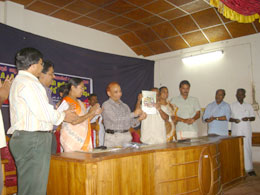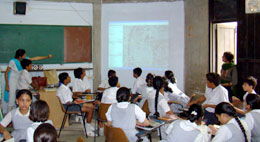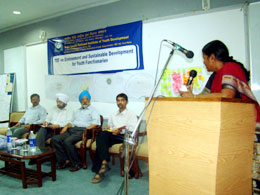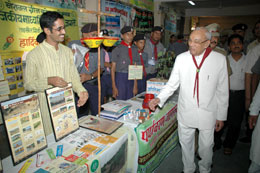Gearing up for Gibbon Conservation
 |
Characterized by its white brows the Hoolock Gibbon is also known as White Browed Gibbon
|
Illustration: Mukesh Panchal
CEE Illustration Bank |
|
|
Beside human beings, Hoolock Gibbon (Hoolock hoolock ) is the only ape found in Indian Subcontinent. These tree dwelling apes are exclusively found in protected areas of the North-Eastern states of India. Great ape populations (including the critically endangered Gibbon) have declined to the point that long term survival of the species in the wild is in jeopardy. It faces serious threats due to habitat fragmentation, hunting for its meat, slash and burn cultivation and timber felling. They are also caught as pets and their parts are used as traditional medicine and in religious ceremonies in the region.
CEE Meghalaya has initiated the Hoolock Gibbon Conservation Awareness and Education Program in collaboration with United States Fish and Wildlife Service under its Great Ape Conservation Fund.
Site Specific Conservation Education Programme will be undertaken in selected Gibbon Sanctuaries of Assam, Nagaland, Manipur, Meghalaya and Tripura involving selected 20-25 schools and a local NGO partner forming a cluster. The programme will involve development of Gibbon educational packages in the context of northeast to support environment friendly classroom teaching - learning sessions; orientation workshop series for NGOs and teachers; year-long school cluster activities; and evaluation of information and attitudinal changes brought about by the project. The project will take into account the basic needs and aspirations of the local populace and engage them in meaningful partnership for conservation. Great Ape Campaigns will be organized in nearby selected reserves with support from the forest department to lay emphasis on community participation and local protected area management.
|
|
 |
Pilot Project for Integrated Development
Pilot Project for Integrated Development (PPID) is a special project conceived by NABARD (National Bank for Agricultural and Rural Development) with the objective of bringing integrated development of selected backward blocks across the country through convergence of programmes of various development partners. The project focuses on the development of three basic sectors viz. infrastructure, economic and human resources through people's participation. Peravoor Block in Kannur district of Kerala has been selected for this unique experiment. CEE Kannur has been selected as the Nodal Agency for the implementation of the project in Peravoor block.
 |
PPID plan for Peravoor block was launched on 18 July 2009 . Chief General Manager, NABARD, Kerala Regional Office released the plan document. |
|
|
A detailed development plan has been prepared for the block after carrying out participatory rural appraisals and series of consultations with different stakeholders. The proposed plan gives a consolidated account of the problems identified, possible causes, suggested solutions and implementable projects. It is expected to be implemented with the active participation of all stakeholders within a time frame of 3 years. A number of convergence models have been built into the plan, the important ones being a dairy development project, a goat village project and the Kotiyoor pilgrim tourism project.
|
|
 |
Energising Partnerships
CEE & JSW Energy (Ratnagiri) Limited are collaborating on an energy project in Ratnagiri, Maharashtra . This project is a positive example of Corporate Social Responsibility (CSR). The project focuses on providing alternate livelihood options to the community involving environment friendly techniques and actions. Prabhjot Sodhi (National Cordinator, SGP India) visited the project with an aim to strengthen the systems developed and to review the progress made. The community organizers were reviewed for their work on Participatory Planning Process and reporting systems, developing village work plans. Meetings were also held with the JSW officials and community organizers to explore and create necessary links with the local NGOs and other related partners in the area, for the sustainability of the project.
 |
Understanding about village settlements, community dynamics, village group meetings and process of meetings in the village was part of the agenda. |
|
|
|
|
 |
‘Green Teachers' learn about environment in monsoon showers
13 teachers from eight schools participated in a 4-day Green Teacher workshop held at Ahmedabad from 23 – 26 July, 2009. This was the first contact session in the one-year Green Teacher diploma course offered by CEE to in-service teachers. As a part of the programme, teachers attend two workshops and learn about various approaches of environment education in schools including activities, role plays and using ICT for Environment Education. The teachers also visited Thol Bird Sanctuary and Sundarvan Nature Discovery Centre to discuss use of these places for education.
|
|
 |
 |
CEE ka Biscope
CEE ka Biscope is an educational module meant for students in the age group of 10-14 years (Class IV - VIII). This ICT enabled module is specially designed to provide interactive and fun-filled learning forum for students focusing on enhancing map reading, navigational skills and use of maps and satellite imageries.
 |
GIS and ICT tools enrich teaching-learning experiences |
|
|
Practice-based learning for interpreting the local environment and surroundings is integral to the philosophy of this module. Pedagogically sound learning sessions enhance students' skills in modeling, interpretation, simulation and visualization. CEE's Biscope Programme makes use of internet enabled computer labs at the schools towards meeting up learning goals in several subjects as Environmental Studies, Science, Geography, Mathematics and Social Sciences.
The first ‘Biscope programme' commenced at Rachana School , Ahmedabad, with students of class VII and VIII.
|
|
 |
Capacity Building Youth Functionaries
CEE has developed a Facilitators Manual on Environment and Sustainable Development for conducting Training of Trainers workshop for the Youth Functionaries of Government of India. The first training was held at Jammu University on 9 – 14 July. The initiative is supported by Rajiv Gandhi National Institute of Youth Development, Sriperumbudur.
 |
Gopal Kumar Jain, Programme Coordinator, Youth Programmes and Ramesh Savalia, Programme Coordinator, Sustainable Livelihood, were the resource persons from CEE |
|
|
National Service Scheme Programme Officers from Jammu and Kashmir attended the programme. They were oriented to diverse aspects of environment and sustainable development through an activity approach. Climate Change, Sustainable Lifestyle and Consumption, Youth and Governance and Youth as Agents of Change were some of the highlights. Participants also visited a Social Forestry site which was analysed in the context of three dimensions of sustainable development—social, economic and environmental. Annual action plans were developed on issues of Waste Management and Energy and Biodiversity Conservation.
|
|
 |
Eco Fair
CEE Jaipur which is the State Resource Agency for National Green Corps (NGC) programme in Rajastan, facilitated a State level Eco Fair. The fair was organized by Rajasthan Bharat Scouts and Guides on 17 th and 18 th July. 15 NGC schools participated in the exhibition through models, demonstrations, displays and other activities. One day training programme was also organised for teachers and students.
 |
A stall was set up by CEE Jaipur and various educational materials developed under the NGC programme in Rajasthan were displayed. |
|
|
|
|
 |
Reaching Out
CEE Madhya Pradesh continued to take the opportunity to reach out to schools and teachers. An awareness campaign on climate change was organized in 5 schools of Bhopal covering more than 900 students and 60 teachers.
Eco-Clubs were formed in Maharshi Centre for Educational Excellence and the students were oriented on the role and responsibility of the club and its activities. Saplings of various medicinal, aromatic, flowering and fruiting species were planted by the students at an Investiture ceremony.
|
|
 |
Climate Change Education as part of ESD
A 3 day seminar was organised by UNESCO on 27-29 July in Paris, in collaboration with the government of Denmark, to discuss how Climate Change Education (CCE)is an essential component of ESD, and calling for more interdisciplinary action and cooperation. The discussions focussed on how climate change issues can be integrated into educational programmes and curricula with special reference to the small island developing states. While the first day had plenaries with several presentations on climate change issues around the world, the next two days focussed on working group discussions. The objective was to formulate a vision and recommendations for i) educational policies, programmes and curricula, ii) CCE tools, materials and good practice, and iii) networks and partnerships for CCE. Other issues discussed included mobilizing support for relevant teacher training, enhancing the exchange of good practices on CCE and finding ways to better use existing networks such as the ESD networks, UNESCO Associated Schools Networks and World Heritage sites to promote local field-based education. The results of the seminar will feed into the preparations for the United Nations Climate Change Conference in Copenhagen on December 7 to 18.
 |
The seminar brought together 60 climate change, ESD and curricula development representatives. Prarthana Borah, CEE Ahmedabad and Rixa Schwarz, CEE Germany at the Seminar with Charles Hopkins. |
|
|
|
|
|


